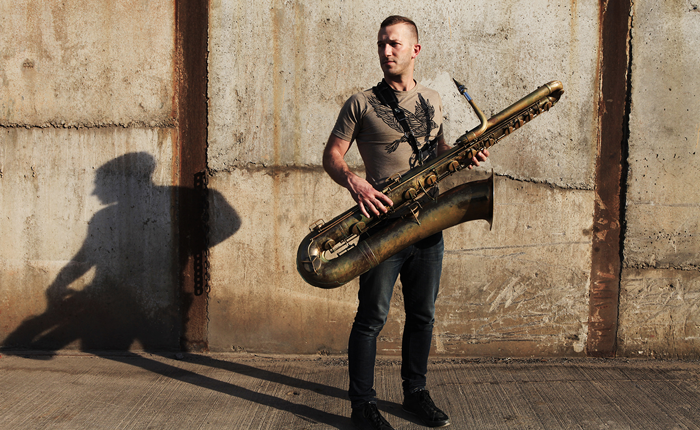Colin Stetson [Interview]
BY TOM PHELAN
THURSDAY, 21ST NOVEMBER 2013
So Colin, how are you liking Dalston?

mean, honestly, I’ve only been at the venue.
It’s the part of London where a lot of bands play, so was there a similar area where you grew up?
Well I grew up in a much smaller town than London so there were places we played, but there was really only one. There weren’t really many neighbours.
So a small town?
Yeah. Well I wouldn’t call it a small town. It’s a college town, the town I grew up in.
What’s it called?
Ann Arbor. I mean, when I say small town in the states I think like one of those one road towns with a corner store and a church, so this wasn’t a small town, this was a little suburban-ish college town.
So what does you latest album mean to you as an artist?
I made it.
(Laughter) I mean, can you explain any themes that are running through it?
Well, the third one is the end. It’s largely dealing with death. I mean, when I first set out to make the third one my goal was to really explore the relationship between death and love, and how we create significance in both of them, and how they are necessary in our lives for the other to become significant. And gradually in making it, though that stayed in tact, there was more of a blanket sentiment which I think kind of ended up being partially umbrellered over the whole trilogy. Basically questioning the need… well maybe not questioning, but casting a light in the phenomenon of humanity as always needing to conjure up these notions of afterlife and immortality because of the seemingly impossible task of just accepting an ending of one’s conscious experience. So that’s kind of where it ended up.
And obviously Justin Vernon features on the record, and you’ve played in the studio a lot with him before. Was there a change in dynamic in the studio? In terms of how you guys work together?
Well not explicitly a change of dynamic on its face. I mean, functionally yes. When we were doing Bon Iver songs my job, my intention is to take what I do and to support Justin’s vision and make… so I’m doing things that he’s seen in some clarity or I’m doing things that I’ve been able to bring some clarity into, but everything is going through his filter. But when it’s me, and my record, it’s the opposite so we were dealing with things that I was writing, so it’s just a change of director.
So the lyrical themes, were they co-written between you two?
The lyrical themes, when I was prepping everything for Justin I would share with him the demos of the songs so he knew what they were about. I would give him all of the storyline, the abstract narrative that I’d created around the song, whatever imagery I was dealing with, the greater and more specific theme, thematics or emotional content that was in any particular song we were working on, and sometimes some very specific writing I had done. But the intention there was to set him up, to get him into the world I was trying to create and to let his creativity work within those constructs, rather than to just let him run blind. Or to give him too much I thought also, it’s pointless. You don’t have collaborations with people who are singularly talented and tell them exactly what to do.
So if we go back to album number two, a track like ‘Judges’. Without any lyrics how do you as an artist channel those emotions into the instrumental compositions? Can you explain the mental process at all?
Well the question implies that there’s an alternate process of making music without words as to making with words. Y’know, the only difference is that you don’t have to deal with language – that particular language. You’re still dealing with language, it’s just not the English language. So I can say that all of my intent, all of the emotionality and the themes and everything that I’ve tried to pack into these songs is very intentional and it all has to do with the process of creating them, and the process of playing and performing them. It’s all very physical and they’re all very specific to their own ends. I wouldn’t know where to begin in terms of describing that process because it’s always different, just as I imagine it’s different for any songwriter, so needless to say I’m doing it.
The saxophone is often thought of as a jazz instrument. So was that an important phase in your musical journey? Do you play jazz now, do you hang out with jazz musicians?
Yes and no. I mean, I studied jazz when I was young. I played a lot of jazz, I played a lot of stuff that could be construed as jazz by some, but not by others. I still do function in the world that would be seen as mostly jazz by most people, depending on their definitions. So yeah, it’s been a part of what I’ve been doing, but the majority of my schooling was classical and since I’ve been in high school I’ve been playing with singer/songwriters. So there’s never been a moment when I’ve turned from one thing to the next. I’ve just been doing what I like since I’ve been playing.
Interviewed by Tom Phelan.